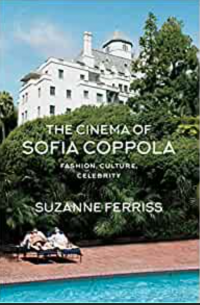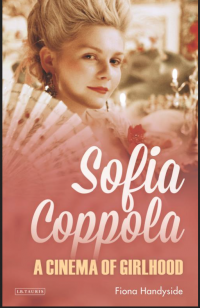






After a whirlwind tour of some recent releases, from Los Angeles, Jeff Godsil briefs us on My Man Godfrey. Finally we assess two new books on the cinema of Sofia Coppola.
–––––––––––––––––––––––––––––––––––––––––––––––––––––––
One of the best American filmmakers working today is Sofia Coppola, though her style may be too “exquisite” for many tastes, as are the films of Whit Stillman. She’s won an Oscars and other awards and manages to make a movie about every two or so years, and most of them have a large cultural presence, especially Lost in Translation. Indeed, she has made enough films to warrant critical studies of the work. There are now two:
The Cinema of Sofia Coppola: Fashion, Culture Celebrity, by Suzanne Ferriss, just published by Bloomsbury, and Sofia Coppola: A Cinema of Girlhood, by Fiona Handyside, from I. B. Tauris publishers.
Ms Handyside is concerned with tracking the rise of feminist film studies and then fitting Coppola’s work into the current trajectory. It’s a good survey and the author avoids the usual feminist writers and cites many who are new to me.
Ms Ferriss focuses on the interplay between what is on the screen, the life, and the culture at large, and comments on many other Coppola projects besides the films. It’s a thorough account. The author even finds room for Coppola’s TV movie A Very Murray Christmas, where it is viewed as a parody of ’60s style cameo-laden Xmas specials. I’m glad the film was given some serious attention. Coppola’s next project is apparently an Edith Wharton adaptation, The Custom of the County which seems to fit into this cavalcade of subjects. On another note, next spring, Ms Ferriss's BFI monograph on Lost in Translation comes out.
With their emphasis on fashion, female culture, celebrity, media, wealth, girlhood and girl-culture – a sociological subject that began to receive notice in the ‘80s – and so on, these books provide valuable information and some close readings, but I’m wondering if there isn’t some big picture stuff that is being overlooked or minimized. For example, a theme that runs through most of her films is the idea of being “on display,” observed, watched over, and the subject’s reaction to that. Even in The Beguiled remake, based on someone else’s book and film, the girls in the school are monitored, so at some level the theme is consciously sought out or unconsciously crops up.
Her father himself figures in a loose trilogy that comprises Lost in Translation, Somewhere, and On the Rocks, and in these films, the theme is reversed, and the daughter figure is the observer. For years a dream project of Francis Ford Coppola’s was Megalopolis, a film set in Tokyo and apparently loosely drawn upon Goethe’s Elective Affinities. It hasn’t quite yet come to fruition, but I’ve always thought that Lost in Translation is itself a loose combination of some of that bigger work’s elements. Scarlett Johanson’s character is more or less on her own in Tokyo, but is caught up in the mid-life crisis of an acting celebrity within the chrome and mood musicified high rise hotels of that huge city, while her filmmaker husband is also otherwise engaged. Alone, she finds herself visiting parks and monasteries and observing, questioning and eventually meets the Bill Murray character, a Hollywood actor. Elle Fanning is the daughter in Somewhere, the European-film inflected story in she too is the observer, and On the Rocks has a more explicit father-daughter tension between an observer-writer, and a flamboyant father figure. These films give a fine contrast to others, such as the watched, in fact spied on, Lisbon Sisters in The Virgin Suicides, and especially Marie Antoinette in that film, a woman stitched into a restrictive, regulated, court world whose irreality requires constant monitoring.
Also available is a new blu-ray set of Coppola’s first film, The Virgin Diaries. This film announced that Coppola was a promising if already confident filmmaker (she had already made several music videos, a cool gateway job at the time). A visual style was already fully formed, performers were well-directed, the source book was semi-controversial, and she managed to adapt its difficult narrative gimmicks. This disc includes numerous secondary features, some old and some new, including:
New 4K digital restoration, approved by director Sofia Coppola and supervised by cinematographer Ed Lachman, with 5.1 surround DTS-HD Master Audio soundtrack on the 4K UHD and Blu-ray.
In the 4K UHD edition: One 4K UHD disc of the film and one Blu-ray with the film and special features.
Interviews with Coppola, Lachman, actors Kirsten Dunst and Josh Hartnett, novelist Jeffrey Eugenides, and writer and actor Tavi Gevinson.
Making of “The Virgin Suicides,” a 1998 documentary directed by Eleanor Coppola and featuring Sofia Coppola; Eleanor and Francis Ford Coppola; actors Dunst, Hartnett, Scott Glenn, Kathleen Turner, and James Woods; Eugenides.
Lick the Star, a 1998 short film by Sofia Coppola
Music video for Air’s soundtrack song “Playground Love,” directed by Coppola and her brother Roman Coppola
Trailers
English subtitles for the deaf and hard of hearing
A booklet insert with cast, crew, transfer details, and an essay by thriller novelist Megan Abbott, who contemplates the dark side.
A new box cover by Naomi Hirabayashi.
For those of you who don’t, isn’t it time to take Sofia Coppola seriously?
- KBOO


